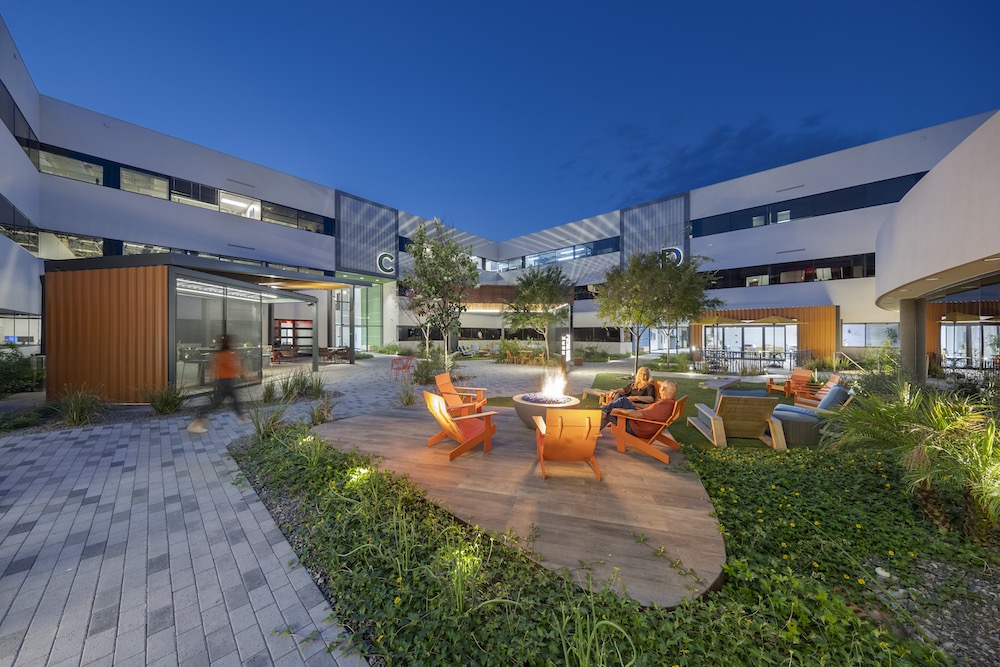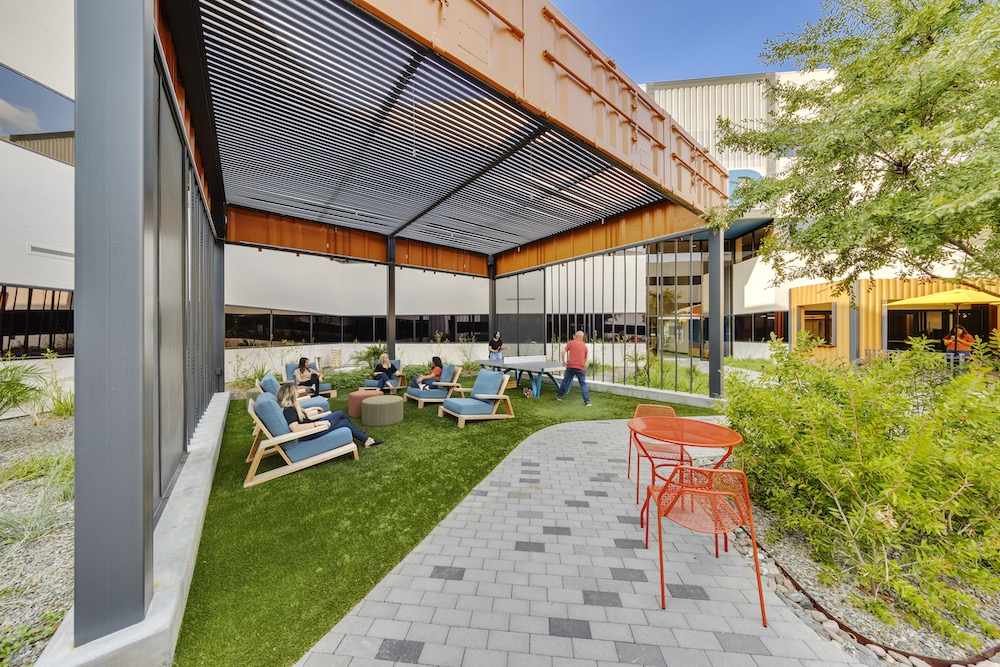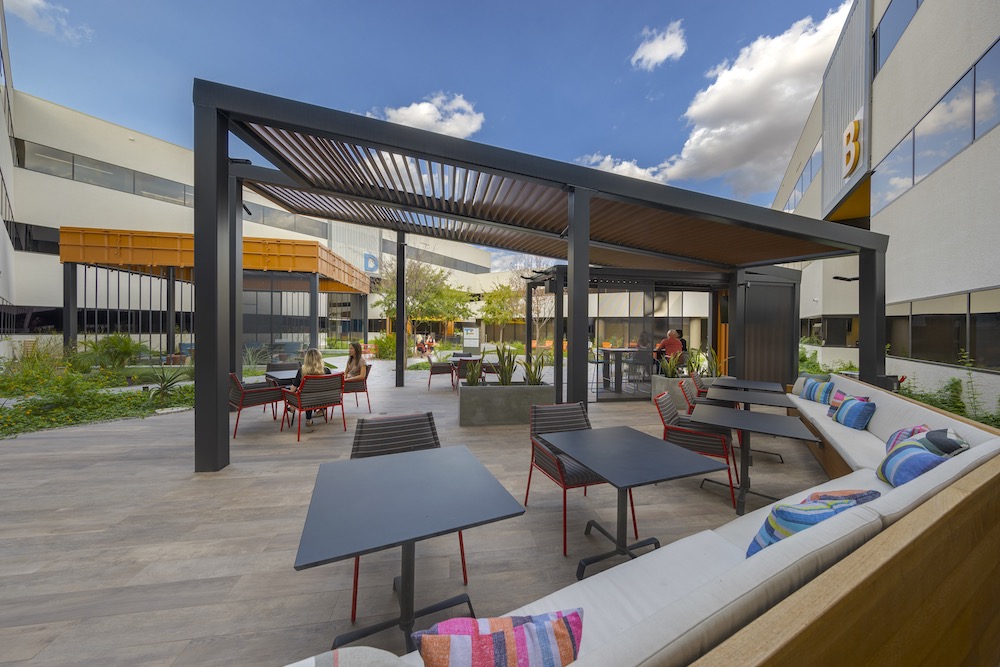SmithGroup’s Michelle Romero and Simone Schoen share tips and inspiration for creating outdoor workspaces.

As we move beyond childhood, humans spend less and less time outside. In fact, according to the Environmental Protection Agency, most of us spend only seven percent of our entire lives outdoors. This news, paired with the realization that adulthood brings with it more stress, less energy and changes in health and well-being, is concerning – but all hope is not lost. In 2021, the U.S. National Park Service reported over 297 million visitors to locations across the country, indicating that people are returning to nature and seeking out new opportunities to enjoy the outdoors.
This leads us to wonder: If there was a place you could go to offset negative health conditions brought on by aging, would you exert the effort and go? What if that place was just outside your front door? There have been countless studies documenting the amazing benefits associated with being outdoors. A few positives include:
- Increased Happiness: Spending time outside in the sun and fresh air can positively impact mood and reduce anxiety.
- Improved Energy: Fresh air helps to burn fuel in your cells, which allows you to feel more focused, energized and productive throughout the day.
- Stress Relief: Breathing in fresh air reduces cortisol and other stress-inducing hormones, which can result in reduced feelings of anxiety and a more positive attitude.
- Rest for Eyes and Brain: Staring at a computer screen for hours on end strains the eyes and leads to mental and physical exhaustion. Taking a break and heading outdoors gives the eyes and brain a chance to rest and reboot.
- Improved Overall Health & Well-being: Spending time outdoors offers several mental and physical health advantages. Vitamin D from the sun helps fight off illnesses and improves poor health conditions, while stepping outside – away from work-related stressors and tasks – can also help reduce backache, body pains and more.
- Enhanced Memory & Cognitive Function: Sunlight energizes and relaxes the body and helps to boost cognitive abilities. Spending time in nature may also help to enhance long and short-term memory functions.
While research is still being conducted to further prove these benefits, people are paying closer attention to this topic. In physical office environments, solutions that create and reinforce connections to nature are at the forefront of current workplace design strategies. Office tenants are looking for ways to enable staff to have access to natural daylight, views of thoughtfully designed landscapes and fresh air. Likewise, building owners are seeking opportunities to offer tenants a range of outdoor workspaces and amenities, giving them a competitive advantage against similar existing buildings while also keeping pace with new facilities that provide similar spaces and services.
A recent renovation at The Square in Scottsdale, Arizona is a great illustration of workplace design strategies in action. This unique building was designed around an enclosed courtyard, with the facility divided into quadrants. Prior to the renovation, each quadrant had its own building lobby, which made wayfinding difficult. When new owners took over the property, they wanted to solve this challenge while also creating an amenity that activated the courtyard for tenants and allowed guests to enjoy this outdoor space, too.


To achieve these goals, designers first moved the building directory to the middle of the courtyard. Next, the courtyard was divided into several new activity-based zones. To create an outdoor meeting space, the team opened the wall between the courtyard and the building’s shared training room and outfitted the new exterior-facing workspace with tables, chairs, banquette seating and an enclosure equipped with display monitors and A/V connectivity capabilities. Additionally, the facility’s existing common café, which had a small, covered patio that adjoined the courtyard, was expanded and modified to extend further into the outdoors. Colorful umbrellas were added to enhance aesthetics and invite people to utilize the area.
Two “play” zones were also added to the courtyard. A shade canopy covering a ping pong table and lounge furniture was positioned to break up space between the café and training patio, while a multi-function, open grass area was incorporated to accommodate activities from yoga classes to games like corn hole. A raised deck with fire pit and seating was also provided to encourage occupants to use the space in the evenings.


In addition to giving office tenants an array of amenities that could be used during the workday, this courtyard renovation also benefitted the existing fine dining restaurant connected to the building. Now, the establishment and its patrons can use the courtyard at night and on weekends – an added bonus for the building’s owners.
For over two years, individuals in the workforce have become accustomed to working from home, where flexibility and access to the outdoors were easily available. Now, employers and building owners must provide choices and amenities comparable to what people had while working remotely. As a result, organizations and building owners are creating a new range of outdoor workspaces to not only attract and retain top talent but also show their commitment to employees’ well-being.

